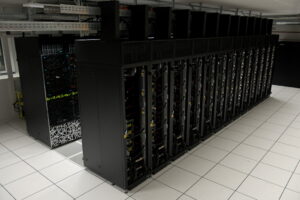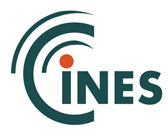CINES hosts advanced equipment including the supercomputer by GENCI( Grand National Equipment for Supercomputing ), which appears to date from the first European machines.
The computational power made available to the research comunity gives researchers the opportunity to address big scientific challenges. Extreme simulations of complex physical situations, which were not realizable until recently, in various domains as fluid mechanics, physics, chemistry, biology, climatology, astrophysics, environment etc…are now possible. Numerical simulation has become a method for research at the same level as analysis and experience, and therefore, the community of users of supercomputing capabilities increases and is renewed every year.
A supercomputer ranked at world level with a peak performance of 3.5 Pflops[1]

Result of a competitive dialogue procedure conducted by GENCI parallel bullxsupercomputer, designed by the French company Bull is hosted at CINES since December 2014. This system has a peak power of 2.1 Pflops (2 million billion operations per second). Designed on the basis of shared memory compute nodes interconnected via an InfiniBand network , it consists of 85824 core Intel Xeon ™ each with 2.5 GB of memory.
A local storage capacity of 5 Po allows rapid access (106 GB/s) data ( /scratch ) managed by the parallel file system “Lustre”. A second space ( /home ) Panasas type a rate of 5 GB/s.
A côté de ce très grand équipement, le CINES propose différentes ressources de calcul complémentaires de moindre puissance (BullX) mais donnant accès à des technologies de pointe qui permettent d’adresser une grande variété de problèmes et à des services de pré-post traitement, notamment de visualisation de résultats de simulations.
Performant software
Les différentes plates-formes disponibles sont équipées des logiciels de base (compilateurs, bibliothèques mathématiques, outils de parallélisation, etc.) et de logiciels spécifiques aux différentes disciplines scientifiques en fonction des besoins exprimés par les communautés scientifiques à travers les demandes de ressources. Tous ces outils sont choisis afin de tirer les meilleures performances des calculateurs.
Quality services for scientific users
The department of Intensive Computing aims at training, advising and helping researchers to use the computing environments, at managing and optimizing the usage of the clusters, and at participating in national and european projects. It offers:
- training in the parallelization of codes
- seminars about the contribution of parallel clusters
- advice and help for users
- documentation which is made available online
- technological surveillance, through collaborations with university laboratories : welcome of interns, thesis students, or post doctoral employees, and with the R&D teams of the suppliers
- the scientific on site welcome of experienced researchers from France or Europe for a better interaction with CINES experts with a participation of CINES in the housing costs
CINES has strong connections with ‘Maison de la Simulation’ (House of Simulation) in Paris as part of its participation in the « Prace Advanced Training Center » from the European project PRACE and proposes international trainings for parallel computing.
A user’s commity, composed of elected representatives gives the opportunity to CINES to have a better knowledge of the needs of the researchers and to put into place procedures and tools to respond to them.
[1] 1 Pflops is 1 million of billion of floating operations per second
